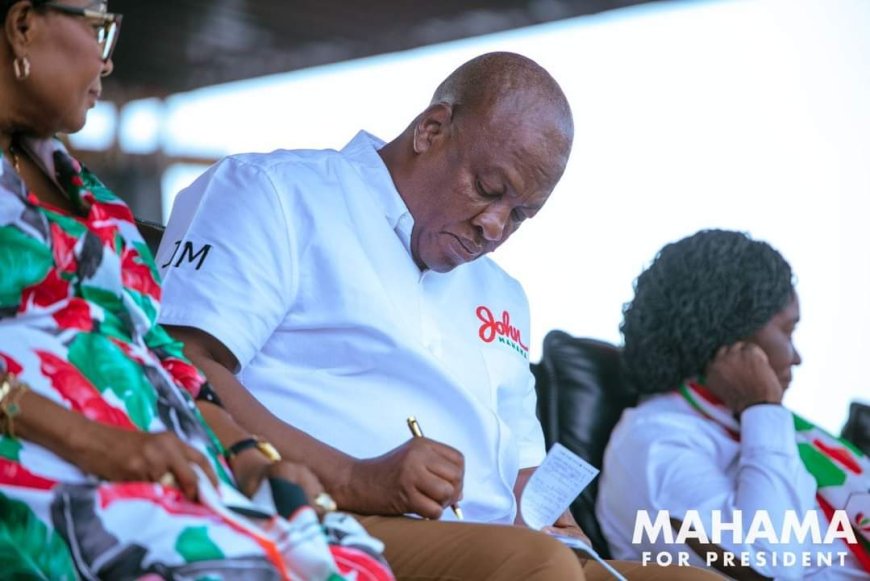John Mahama's 24-Hour Economy and Fight Against Corruption

As Ghana approaches the 2024 general election, the nation grapples with several significant challenges that impact its development and the well-being of its citizens. Key among these issues are economic instability, high unemployment rates, and pervasive corruption.
In response, John Dramani Mahama, the flagbearer of the National Democratic Congress (NDC), has declared a bold agenda to transform Ghana's economy into a 24-hour operation and to implement stringent measures to combat corruption.
This article delves into the core problems facing Ghana and evaluates Mahama's proposed solutions.
Economic Instability and Unemployment
Ghana's economy has faced turbulence in recent years, with high debt levels, inflation, and unemployment creating a precarious situation. Despite the country's rich natural resources, many Ghanaians struggle to find stable employment and face rising living costs.
Mahama's 24-Hour Economy
John Mahama's proposal for a 24-hour economy aims to maximize productivity and create jobs by extending business operations around the clock. This ambitious plan includes several key components:
- Public-Private Partnerships: Mahama plans to foster collaboration between the government and private sector to drive economic activity. This partnership is envisioned to provide the necessary infrastructure, security, and incentives for businesses to operate efficiently at all hours.
- Tax Incentives: Offering tax incentives to businesses that adopt the 24-hour model is expected to encourage more companies to participate, thereby increasing employment opportunities and boosting economic output.
- Stable and Low-Cost Electricity: Ensuring a reliable and affordable electricity supply, particularly during peak night hours, is crucial for sustaining a 24-hour economy. This would not only support businesses but also attract foreign investment.
- Enhanced Security and Transportation: To facilitate around-the-clock operations, Mahama proposes improvements in public transportation and security measures. This would ensure that workers and goods can move safely and efficiently at any time of the day or night.
The potential benefits of a 24-hour economy are significant. It could lead to increased productivity, job creation, and a more dynamic business environment. However, implementing such a system requires substantial investment in infrastructure and a cultural shift towards flexible working hours.
Pervasive Corruption
Corruption remains one of the most pressing issues in Ghana. It undermines economic growth, erodes public trust, and diverts resources from essential services. The Transparency International Corruption Perceptions Index consistently highlights Ghana's struggles with corruption.
Mahama's Strong Fight Against Corruption
John Mahama has committed to a robust anti-corruption agenda, which includes:
- Strengthening Anti-Corruption Institutions: Empowering institutions like the Commission on Human Rights and Administrative Justice (CHRAJ) and the Office of the Special Prosecutor to investigate and prosecute corruption cases more effectively.
- Transparency and Accountability: Implementing measures to increase transparency in government operations, such as open contracting and access to information laws. This would make it easier for citizens and watchdog organizations to hold public officials accountable.
- Public Sector Reforms: Introducing reforms to reduce bureaucratic red tape and streamline processes within the public sector. Simplifying procedures can minimize opportunities for corrupt practices and improve service delivery.
- Asset Declaration by Public Officials: Mandating the declaration of assets by public officials to ensure transparency and accountability. This measure aims to deter corruption by making the financial status of public officials more transparent.
- Prosecuting Corrupt Officials: Committing to prosecute past government appointees found guilty of corruption and any individuals involved in corruption within his administration. This zero-tolerance approach sends a clear message that corruption will not be tolerated at any level of government.
- Whistleblower Protection: Enhancing protections for whistleblowers who expose corruption, ensuring they can report wrongdoing without fear of retaliation.
Addressing Ghana's Challenges
While Mahama's proposals address some of the critical issues facing Ghana, their success will depend on effective implementation and public support. The 24-hour economy offers a promising solution to economic instability and unemployment, but it requires careful planning and execution. Combating corruption is equally vital and necessitates a strong commitment from both the government and citizens.
Conclusion
As Ghana heads into the 2024 election, the nation stands at a crossroads. The challenges of economic instability, unemployment, and corruption demand bold and innovative solutions. John Mahama's vision of a 24-hour economy and a resolute fight against corruption presents a comprehensive strategy to tackle these issues. However, the real test lies in turning these proposals into tangible actions that will transform Ghana and improve the lives of its citizens. The next government must prioritize these critical areas to ensure sustainable development and restore faith in Ghana's future.





